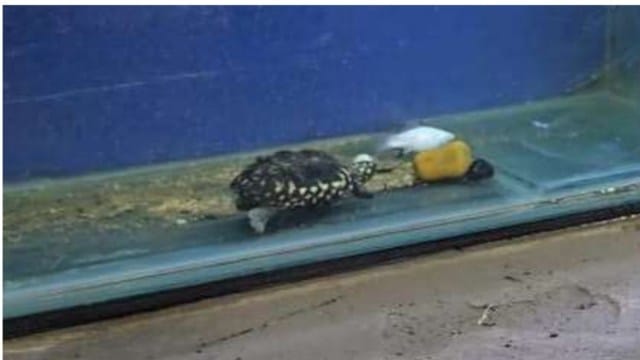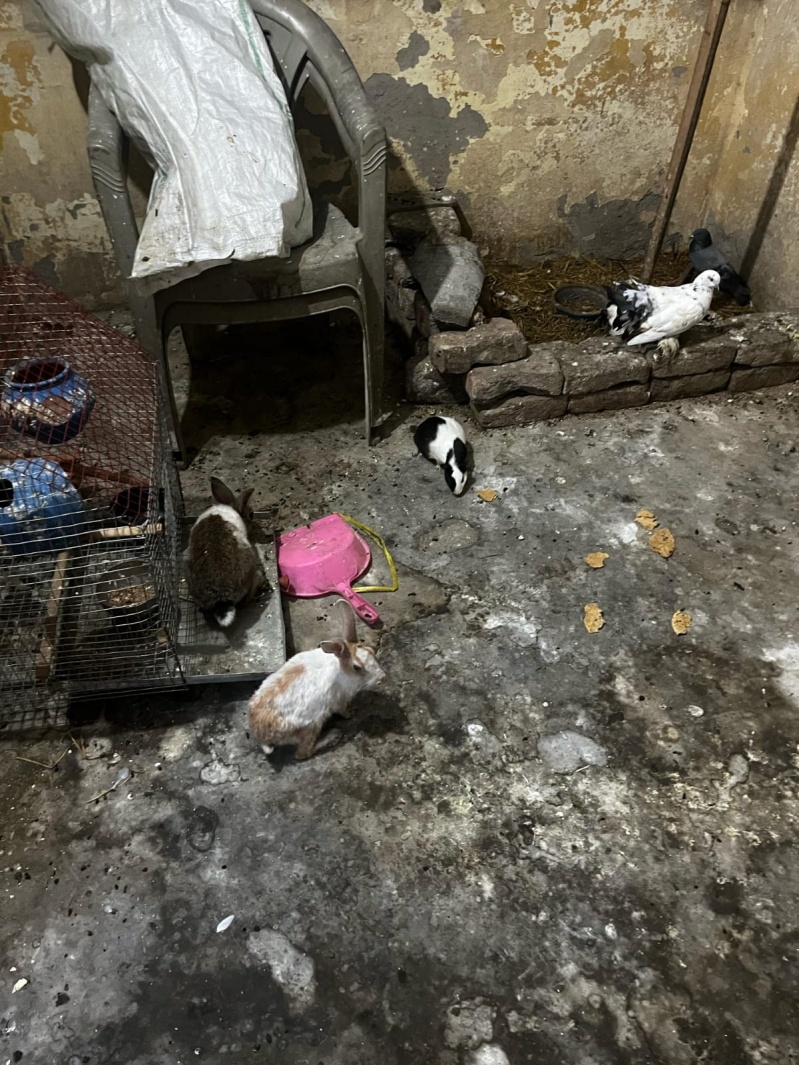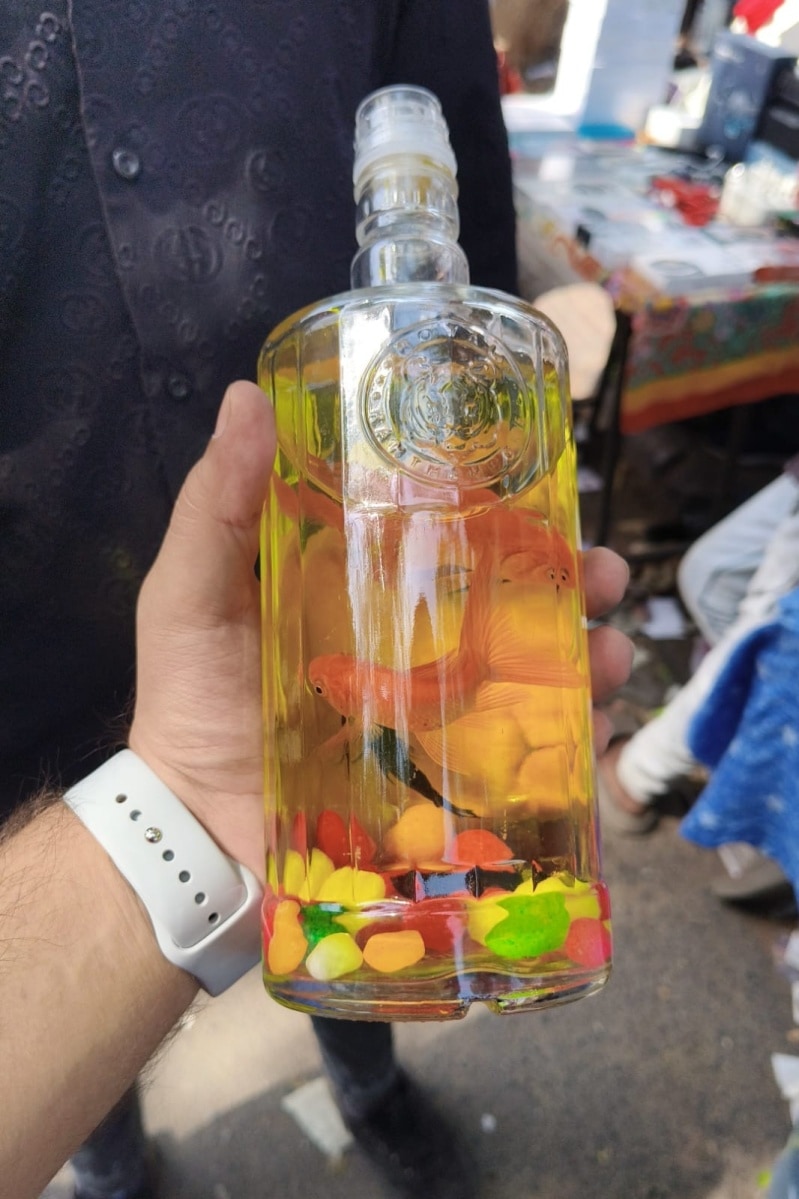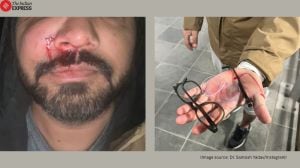Goldfish stuffed in bottles, selling exotic tortoises: report on pet shops in Delhi highlights irregularities
The survey, supervised by faculty members of the Law Centre and the Dean of the Faculty of Law under the University of Delhi, was designed to evaluate compliance with the Prevention of Cruelty to Animals (Pet Shop) Rules, 2018.
 A star tortoise was found for sale in a pet shop in Delhi, as per the report. The species is protected under Schedule 1 of the Wildlife Protection Act, 1972 (Special Arrangement or ALC)
A star tortoise was found for sale in a pet shop in Delhi, as per the report. The species is protected under Schedule 1 of the Wildlife Protection Act, 1972 (Special Arrangement or ALC)
Puppies sold before they were weaned, goldfish stuffed into glass bottles, illicit sale of exotic star tortoises, sick animals caged with healthy ones without clean water or veterinary access, and missing licenses – a detailed report by the Animal Law Cell (ALC) under the Faculty of Law, University of Delhi, has highlighted recurring patterns of violations in pet shops across Delhi.
Eighteen students of the ALC undertook field visits to 34 pet shops across eight zones of Delhi, including Shahdara, Central Delhi, Rohini, Janakpuri, Uttam Nagar, Malviya Nagar, Khan Market, and Burari between April 6 and 9 this year. The survey, supervised by faculty members of the Law Centre and the Dean of the Faculty of Law, was designed to evaluate compliance with the Prevention of Cruelty to Animals (Pet Shop) Rules, 2018.
“We encountered deplorable housing conditions, lack of basic necessities such as feed and water being provided to animals that blatantly violate the PCA Act and the Pet Shop Rules. The Pet Shop Rules have been enacted to ensure the well-being of animals kept and traded in pet shops, yet most establishments continue to flout them with impunity,” the team wrote in a letter to Anil Kumar Singh, commissioner (development), Delhi Government, and Dr Satyavir Singh, director of the Delhi Animal Welfare Board’s animal husbandry unit, on Monday.
The ALC, in its letter, called for “conducting inspections, issuing closure notices, sealing unregistered pet shops and seizing the animals housed and displayed for sale within these establishments”, besides comprehensive inspection of pet shops at least once a year, continuous monitoring to prevent illegal sale of wildlife, and ensuring accountability in operations by emphasising the maintenance of records in registered shops.
 Animals were kept in horrific conditions (Special Arrangement or ALC 3)
Animals were kept in horrific conditions (Special Arrangement or ALC 3)
As per the report, none of the 34 shops visited had a valid or visibly displayed Certificate of Registration, a basic legal requirement under Rule 3(2) of the Pet Shop Rules, 2018. Many shops had no permanent structures and operated from temporary stalls, street corners, or cluttered interiors filled with stacked cages and tanks, as per the report. It also found issues with waste disposal.
“Most of the shops are in violation of Rule 7, sub-rule(2) of the Pet Shop Rules, as they fail to provide sufficient dietary requirements, lack access to clean drinking water and proper feeding vessels, do not remove food waste, animal excreta, and organic waste on a daily basis, and house animals inimical to each other in the same enclosures,” it said. Many shops claimed to only sell pet accessories, but were in fact supplying animals illegally through personal messaging apps and informal breeder networks.
 Goldfish kept in small bottles (Special Arrangement or ALC 3)
Goldfish kept in small bottles (Special Arrangement or ALC 3)
The violations ranged from unweaned puppies—some as young as 40 days—being openly offered for sale, to exotic birds and reptiles caged in unclean, overcrowded enclosures, with no provision for veterinary care or species-specific needs, the report pointed out. In Northwest Delhi, a vendor – who did not have a proper shop – had kept a pair of goldfish for sale in a 750 ml glass bottle. Those conducting the survey told The Indian Express that the small size of the bottle was harmful to the aquatic creatures as its portability leads to regular shocks.
In several instances, rabbits were kept in metal cages exposed to the harsh sun, birds were seen panting in wire enclosures without shade, and mice were kept in stacked cages without food or water. In other shops, dead fish floated in algae-choked tanks while iguanas, parakeets and turtles were displayed alongside household pets in breach of wildlife protection laws.
The report also carries photographic evidence, shop-wise documentation, and GPS-tagged data. The report highlighted several recurring violations across the surveyed establishments. No shop had veterinary emergency contact information displayed or maintained written health certification records for animals, as required. In many cases, predator and prey species—such as mice, birds, and cats—were housed in adjoining enclosures, causing acute stress.
Staffing standards were equally poor, the report indicated, with several shops operated solely by owners or minors without any trained personnel, despite rules mandating experienced staff for each type of pet animal. A lack of ventilation, shade, or temperature control in many shops exposed animals to extreme heat, in contravention of rules to protect different species.
 Bunnies confined to overcrowded cages (Special Arrangement or ALC 3)
Bunnies confined to overcrowded cages (Special Arrangement or ALC 3)
As per the report, “Although a legal framework exists under the PCA Act and the Pet Shop Rules to regulate pet shops and ensure minimum welfare standards, our findings indicate that there remain significant implementation gaps on the ground. These gaps have allowed a number of establishments to operate without accountability, often at the expense of animal welfare.”
It added: “In many cases, pet shops were unaware of or uninformed about the applicable legal requirements, further highlighting the need for robust awareness, outreach, and enforcement mechanisms. Visibly distressed and unhealthy animals were observed in these pet shops, subjected to inclement weather/sun, unhygienic housing conditions, contaminated food and water.”
The report also found a “large” and “rapidly expanding” online pet trade that is unregulated and held through social media pages and websites operating within Delhi. It noted that these shops are “engaging in the sale and purchase of pets without the requisite registration or adherence to prescribed rules. This unchecked activity not only raises serious concerns regarding animal welfare but also poses significant risks to public health and consumer safety.”












